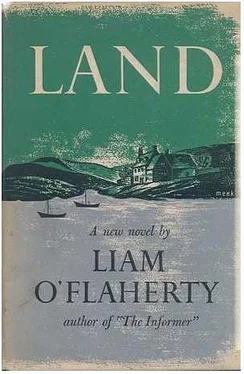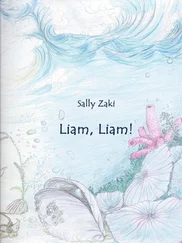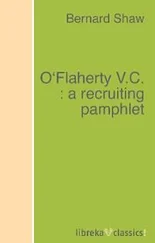Liam O'Flaherty - Land
Здесь есть возможность читать онлайн «Liam O'Flaherty - Land» весь текст электронной книги совершенно бесплатно (целиком полную версию без сокращений). В некоторых случаях можно слушать аудио, скачать через торрент в формате fb2 и присутствует краткое содержание. Город: London, Год выпуска: 2011, ISBN: 2011, Издательство: Bloomsbury Publishing, Жанр: Проза, на английском языке. Описание произведения, (предисловие) а так же отзывы посетителей доступны на портале библиотеки ЛибКат.
- Название:Land
- Автор:
- Издательство:Bloomsbury Publishing
- Жанр:
- Год:2011
- Город:London
- ISBN:9781448203888
- Рейтинг книги:3 / 5. Голосов: 1
-
Избранное:Добавить в избранное
- Отзывы:
-
Ваша оценка:
- 60
- 1
- 2
- 3
- 4
- 5
Land: краткое содержание, описание и аннотация
Предлагаем к чтению аннотацию, описание, краткое содержание или предисловие (зависит от того, что написал сам автор книги «Land»). Если вы не нашли необходимую информацию о книге — напишите в комментариях, мы постараемся отыскать её.
Land — читать онлайн бесплатно полную книгу (весь текст) целиком
Ниже представлен текст книги, разбитый по страницам. Система сохранения места последней прочитанной страницы, позволяет с удобством читать онлайн бесплатно книгу «Land», без необходимости каждый раз заново искать на чём Вы остановились. Поставьте закладку, и сможете в любой момент перейти на страницу, на которой закончили чтение.
Интервал:
Закладка:
“What did you expect me to do?” he said coldly. “Turn him over to the police? I’ve been here a month now. During that time, I’ve tried to let you know as gently as possible what my attitude towards society is going to be, here in County Mayo. Now you force me to be more definite. I regret that very much, because I really dislike being brutal to women. I inherited this property from my father. So I am master here. I intend to be master, in the full meaning of the word. I don’t want any sort of interference with my authority, either on your part or on the part of anybody else. During the past twenty odd years, you have been kind enough to live here. You looked after my mother during her last years. You also tended my brother Julian during his protracted illness. For that I am indebted to you, without being in the least conscience-stricken for not having done it myself. My feeling of indebtedness towards you is not going to influence my conduct in the least, in so far as the exercise of my authority is concerned. You wrote and asked me to return from France after Julian’s death last January. Otherwise, I probably would never have come back. Now that I am back I propose to behave exactly as I behaved abroad. I am what is called nowadays a free-thinker, for lack of a more fitting definition. That means that I adopt a purely personal attitude towards ideas and the phenomena of life. Dear Lizzie, don’t force me to be brutal by trying to interfere with my conduct in any way. You know how cruel and uncompromising men of our family can be, when they feel that their authority is being flouted.”
He raised his hat, bowed, went to the hall door and opened it.
“May God forgive you,” Elizabeth said fervently as he was going out the door.
Raoul looked back at her, raised his hat once more and bowed.
“Thank you,” he said, as he closed the door after him very gently.
Lettice came along the hall as Elizabeth was returning to the living-room. They looked at one another in silence as they passed. Then Lettice ran upstairs.
Elizabeth went into the living-room, closed the door, picked up her skirts and walked with great dignity to her desk in the far corner. She folded her little shawl neatly and draped it over the back of her chair. She sat down, took up her quill pen and bent low over the sheet of paper she had been reading when disturbed by the first reports of gunfire. The quill pen began to touch each word lightly as she read.
She suddenly dropped the pen on to the paper, put her elbows on the edge of the desk, covered her face with her hands and burst into tears.
Chapter II
District Inspector James Fenton, of the Royal Irish Constabulary, arrived in Manister at three o’clock in the afternoon to investigate the attack on Captain Butcher. He brought a force of twenty men, including Head Constable Reilly and his clerk, from the district headquarters at Clash. The party came on five jaunting cars. The horses were all flecked with foam when they halted outside the police barracks in the village square. They had galloped the whole distance of four miles.
The village looked beautiful in the brilliant sunshine to which the morning mist had given place. It faced the ocean above a beach of yellow sand. It was built around a square, along a gentle slope that stretched from the beach-head to the ivied wall of Captain Butcher’s demesne. The houses were all gaily painted in maroon, orange, red and yellow colours. Steep granite cliffs that jutted far out to sea on the north and a flat peninsula to the south made a snug harbour. There was a stone pier. The white tower of a lighthouse stood on a high rock at the far end of the peninsula.
Sergeant Geraghty, commander of the local police garrison, stood outside the door of his barracks to greet the district inspector. A group of the principal inhabitants accompanied him. Other groups of people, most of them being women and children, watched the proceedings from remote corners of the square. The majority of the village men had gone into hiding, fearful of being questioned about the ambush.
“Good day, sir,” Geraghty said, saluting smartly as his superior dismounted.
“Well! Geraghty,” Fenton said, “you’ve been having a little trouble.”
“I’m afraid so, sir,” Geraghty said.
Fenton set his legs wide apart, leaned forward slightly from his hips and nodded briefly in the direction of the other people that were gathered there. He was a tall, handsome Englishman of thirty-six. He belonged to the lesser gentry of his country, like most officers of the Constabulary at that period. He looked quite a dandy in the tight-fitting, dark-green uniform of his corps. His hair and complexion were very fair. His features were well shaped and firm. He bore the arrogant and almost contemptuous expression that seems to be inseparable from a police official. His blue eyes, however, looked troubled behind the mask of arrogance.
Father Cornelius Costigan, the parish priest, stepped forward and saluted. He was a tall and powerfully built man of sixty-two, with curly grey hair and white eyebrows. A high silk hat was perched rakishly on the side of his large skull. Leaning his hip against a heavy walking stick, he addressed Fenton in a tone of solemn dignity.
“Mr. Fenton,” he said, as loudly as if he were addressing an enormous throng, “I want to apologise, in the name of my parish, for the outrage committed this morning on Captain Butcher, by a person or persons unknown.”
Fenton nodded. He felt annoyed by the loud tone in which Father Costigan had spoken. He considered it insulting.
“I appreciate your expression of loyalty, Father Costigan,” he said, deliberately raising his own voice a little, just as when talking to a servant. “I feel sure that your feelings are shared, as you say, by the vast majority of your parishioners.”
Father Costigan bowed and said:
“Thank you, Mr. Fenton. I confidently hope that no hasty action on the part of the police, arising from this isolated act of revolutionary folly, will cause my people to change their attitude of obedience to constituted authority.”
He raised his hat, bowed once more, turned sharply and walked away. His abrupt and almost unfriendly departure explained why he had spoken so loudly. He wanted to make himself heard by all the people in the square. In this way, he let his parishioners understand that he profoundly disapproved of the ambush. At the same time, his cold and formal attitude towards the district inspector and his abrupt departure, after issuing a warning against reprisals of any sort, saved him from suspicion of being a collaborator with the foreign government.
Fenton tipped his helmet angrily with his rolled gloves in answer to the priest’s parting salute. He realised that he had been outclassed in the diplomatic exchange. Then he turned to greet the doctor, who had stepped forward to pay his respects.
“Too bad about this attack on Captain Butcher,” Dr. McCarthy said. “It’s a miracle that the man escaped with his life. Even so, two ribs broken, along with a heavy fall from his horse, is no joke for a man of his age.”
“Just two ribs?” Fenton said as he looked down patronisingly at the little doctor.
McCarthy was very short and fat. Small blue eyes, sunk behind bulging red cheeks, gave him the appropriate nickname of “Piggy.” Although not yet turned forty, he was almost completely bald.
“That was all the damage done, thank God,” he said, “but sure it’s more than enough for a man of his age, as I said before. He was saved by his steel vest. Otherwise, the poor man would be laid out now, ready for skinning. He is a hard man, all right. When I saw him first, I thought it was apoplexy. He was redder in the face than a boiled lobster and he could hardly breathe. It was more shock than the broken ribs that ailed him. I took him up to Manister House in my trap. It’s no joke getting a big bullet smack against the heart and then being thrown from the back of a tall hunter that’s trotting at the time.”
Читать дальшеИнтервал:
Закладка:
Похожие книги на «Land»
Представляем Вашему вниманию похожие книги на «Land» списком для выбора. Мы отобрали схожую по названию и смыслу литературу в надежде предоставить читателям больше вариантов отыскать новые, интересные, ещё непрочитанные произведения.
Обсуждение, отзывы о книге «Land» и просто собственные мнения читателей. Оставьте ваши комментарии, напишите, что Вы думаете о произведении, его смысле или главных героях. Укажите что конкретно понравилось, а что нет, и почему Вы так считаете.












